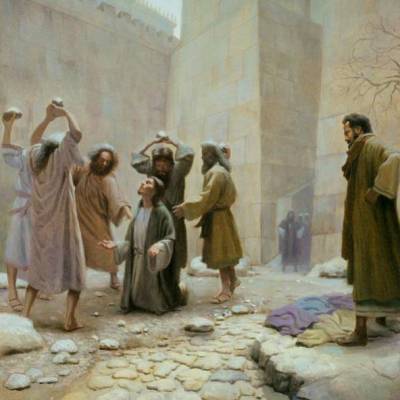Shame, Shame, Go Away
By Anthony Casperson
9-14-19
The man of God stood before his accusers. The high council of the religious elite of his people sought to silence this man. The teaching he had been spouting was disrupting their way of life. And people were falling in line with this system of belief by the thousands.
The man began his defense with what would seem like grade-school tutelage. A Sunday School lesson nearly two millennia previous to its invention. He spoke of the history of Israel. The stories of Abraham, Jacob and Joseph, and Moses took up a lot of time. At this point, the council likely looked impatient because the man’s defense, which continued by mentioning David and Solomon, sped up a bit.
This man’s defense crescendoed to the point of calling the very council before him murderers and betrayers of God. With the power of the Holy Spirit, this man (named Stephen) caught glimpse of the resurrected Jesus standing at the right hand of God, which he proclaimed out loud. And the council charged at him, condemning him to death by being pelted and crushed with rocks. And they let a young man named Saul hold their coats while they performed the deed.
Yeah, that’s the scene of Acts 7, otherwise known as “the stoning of Stephen.” That event recently made an appearance in my morning bible reading. But when I finished the story, a strange thought came into my head.
If Luke wrote the Gospel that bears his name and the book of Acts by interviewing eyewitnesses, as he states in the introduction to both books, then whose testimony gave him this information? The seeming quotation of Stephen’s sermon and especially the statement that he saw Jesus standing at the right hand of the Father seem to come from first-hand knowledge of the event.
(Some might want to say that since the biblical authors wrote with the aid of the Holy Spirit that it was revealed to Luke by God. While I agree with the co-authorship of the bible, Luke’s specific statement that he writes these things which he learned from eyewitness accounts would still make it likely that this was learned through a person who saw these events.)
By the looks of the scene, it was only Stephen and the council who were there. Perhaps also some of the council’s apprentices would be privy to the judgment scene. Stephen, himself, couldn’t be the eyewitness for obvious reasons. So, that only leaves people who were antagonistic to the gospel, the council who sought to shut him up and maybe their apprentices.
But what would cause one of them to tell the story in such a way? Why speak about these events to Luke, one whose sole purpose in writing is to agree with Stephen? That is, unless one of these enemies of the cross came to kneel before Jesus as savior. And that’s where that young man Saul comes in.
The one known more commonly as Paul, the Apostle of Jesus Christ, is mentioned for a reason. He was there before his conversion, cheering on the death sentence. And since Paul says in Acts 22:3 that he sat under the teaching of Gamaliel, who was named as a member of this very same council in Acts 5:34, it would not be unthinkable that Paul himself was there listening to the sermon of Stephen, as his theological mentor sat in judgement.
I want to be clear, at this point I’m purely speculating. This is a guess, educated though it might be. But if Paul was there at this event, and later told Luke about the situation, then he would be one of the few able to tell all of the first-hand knowledge required for this event to be recorded while also (no longer) antagonistic toward the subject.
“Okay, so you think Paul told Luke this part of the story. Why write an entire blog to describe that?”
Well, this is one of the only fully described persecutions carried out in the presence of Paul while he was still an enemy of the cross. Sure, we know that he had persecuted many. He even sought out an edict allowing him to travel the countryside convicting men, women, and children to death. But those are all general statements, things that history could point out without emotional connection.
However, with telling the story of Stephen’s stoning in such detail, Paul had to relive the entire experience in his mind as he quoted the man whom he came to know to be right. The words echoing from the past. The sounds of bones cracking under the weight of rocks. The scent of copper in the air from the open wounds. The angelic visage of a man filled with the Holy Spirit. And the rage that darkened Paul’s soul at the time. The whole event and Paul’s past as enemy of God right before him.
Most of us wouldn’t want to talk about such an ugly moment in our past. The sins that are better kept in the dark. We might think about what shame and pain remembering events like these brings.
But is shame what we should be thinking of when considering these moments? Should we be unwilling to share the disgustingly selfish moments of our past because nothing good could come from such horrible evil?
Sure, there needs to be repentance. And the whole “go and sin no more” perspective needs to be present. But shame should not come over us again. That sin has been taken care of, erased, paid for by the blood of Jesus. That shame taken on by the God-man who sacrificed himself for all who call upon his name.
“But you don’t understand how bad it was,” some might say. Do we think that what we did was worse than using the name of God to kill the people of God? Could our past ever eclipse the past of Paul who dragged people out of their homes, with glee, to bring them to their deaths?
And yet even Paul writes in 1 Tim. 1:15-16, “that Christ Jesus came into the world to save sinners, of whom I am the foremost. But I received mercy for this reason, that in me, as the foremost, Jesus Christ might display his perfect patience as an example to those who were to believe in him for eternal life.”
Do you see shame in those words? Or do you see the godly perspective of the past? If there was anyone who could wallow in the shame of their past, it was Paul. But he chose to see his past through the grace of God. That shame was paid for by the one who turned that passion from hatred to love.
Sure, it took a while for some of his fellow followers of Jesus to trust Paul. And likely, some were leery of his presence until the day they died. But look at the glory that God receives when his perfect patience is revealed. How many people were (and still are) touched by the work of God through this once enemy of God.
The same should be true of us. The stories cease to be our pain and become the glory of God when we share them in his light.
So, what stories of our past have kept us in shame? What sins remind us of pain? Allow God to reveal his glory in our story.




